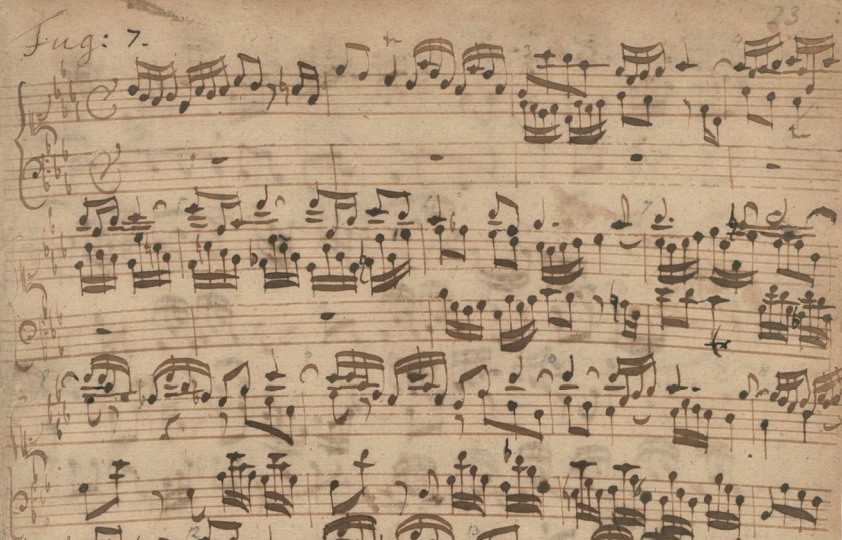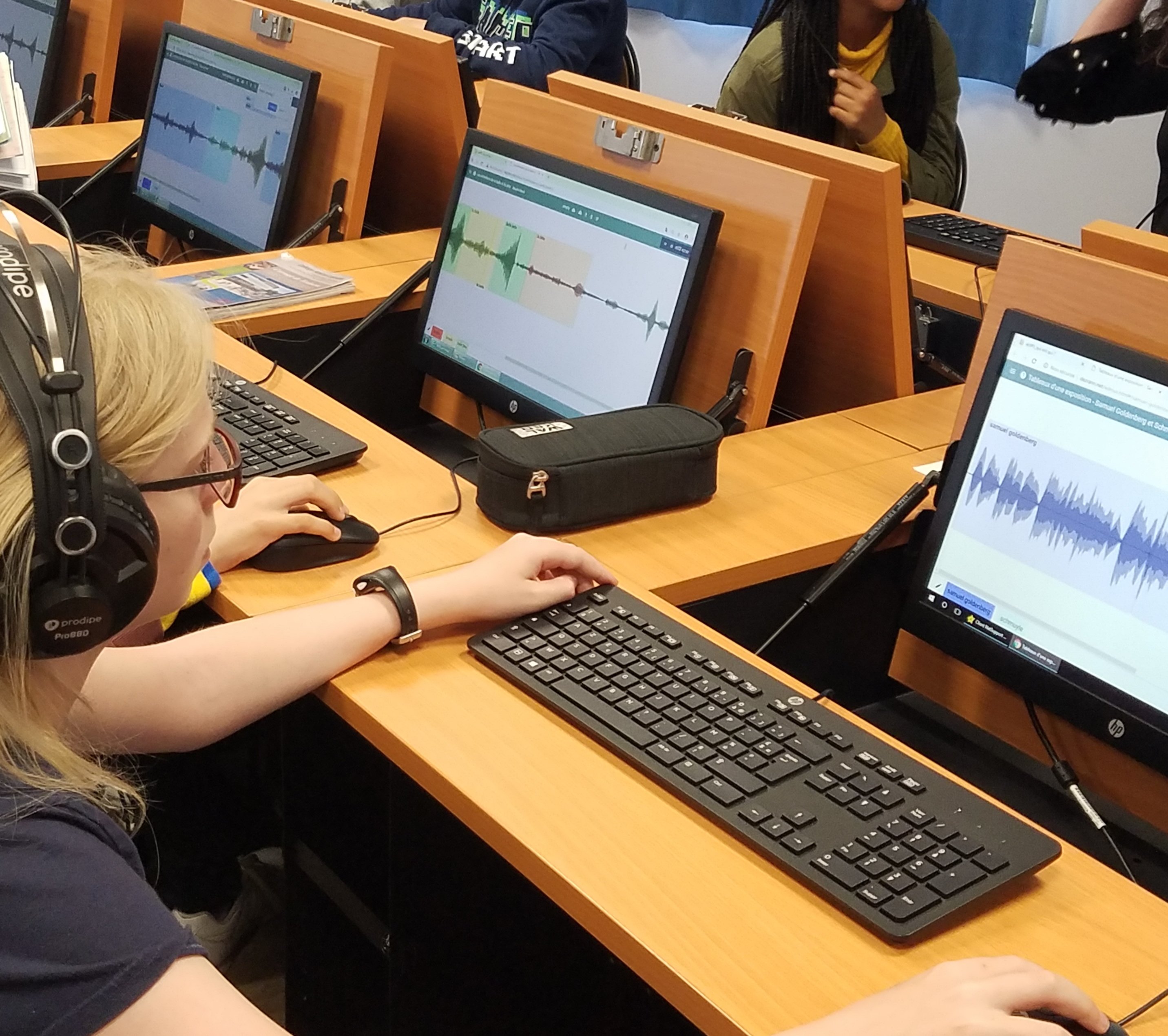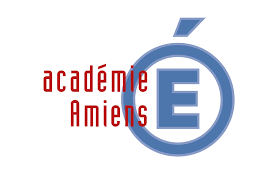Algomus
🇫🇷 français
Algomus – Algorithmic Musicology – is a research team in Digital Humanities,
more precisely in Music Information Retrieval (MIR).
We focus on high-level modeling, analysis, and co-creative transformation and generation of music,
for music theorists, musicians, music lovers, and everyone.
The team also conducts research on the ethics of music research, whether concerning AI or the diversity of musical repertoires.
We are located in the Hauts-de-France region.
We belong to the CRIStAL computer science department
of the Université de Lille
and have strong links with the MIS computer science lab
of the Université de Picardie Jules-Verne, in Amiens.
We are also funded by the CPER MAUvE
and by Sciences et Cultures du Visuel.
We use the scientific computing service Mésocentre de Lille.
Music co-intelligence and co-creativity
Collaborating with music theorists, we study high-level music data — mainly symbolic data, such as music scores, tablatures, chord grids, and other musical data and metadata. We also conduct studies on audio data when it’s related to high-level musical structures.
Our work focuses primarily on tonal music — including baroque, classical, romantic, jazz, pop, and dance repertoires — but we are more broadly interested in analyzing and modeling any kind of music. We model patterns, melodies, harmony (chords, chord progressions, cadences, micro-tonality), rhythms, and texture. Ultimately, we aim to model musical structure and musical creativity.

We combine musicological knowledge and computer science methods
in text algorithmics, data mining, machine learning (ML) and artificial intelligence (AI).
Black-box methods analyzing or producing music are not our main focus.
We are rather interested in designing explainable algorithmic and ML/AI methods
trying to model what makes music and providing people with tools to help them
to understand, to play with, and finally to enjoy music.
The team uses music structure as a “driving force” to model, analyze, transform, and generate music, in the two following themes:
-
Music modeling and analysis for systematic/empirical musicology.
The team has a strong track record in corpus studies and Computational Music Analysis.
We have worked on musical forms from the Western tonal tradition, such as fugues, variations, and sonata forms (2013–2019), and more recently (2022–2025) on piano sonatas and trio sonatas. We also place a strong emphasis on preserving, valorizing, and studying diverse corpora — including those in ethnomusicology and those representing under-represented or silenced minorities — with the broader goal of promoting diversity in corpus-based music research.
We develop techniques for modeling, preparing, and interacting with musical corpora, in order to curate and organize large-scale collections of musical data, in particular through the Dezrann platform. In collaboration with music theorists, we thus aim to provide new perspectives on musical forms, genres, styles, and cultural contexts, as well as to create tools for music pedagogy.
-
Co-creative music modeling, transformation, and generation.
Knowledge modeling and machine learning techniques are also used to explore sound and music generation for various co-creative tasks, such as computer-assisted composition, arrangement, or human–machine co-improvisation. Our focus on high-level structures allows us to investigate areas and dynamics of sound and musical co-creativity that are rarely explored. We seek collaborations in artistic projects and in the field of video game music.
This is illustrated by several co-creative projects, such as our participation in the AI Song Contest (2020, 2021), where we were among the few teams to integrate structure and arrangement into their co-creative process. It is also reflected in the ANR MICCDroP project (2025–2028), which explores AI methods for lifelong learning and agent personalization in music generation, and in our contributions to The Call and Starmirror (2024–2026), both collaborative projects with Holly Herndon.
Open methods, open data
We publish
our methods, our code, and our corpora
in the Music Information Retrieval community,
with 80+ publications in established conferences (ISMIR, SMC…) and journals
(TISMIR, Computer Music Journal…).
Most of our data is available under open-source licenses
from http://gitlab.com/algomus.fr/algomus-data.
Our corpora are also published on the Dezrann platform.

Music research for everyone
We collaborate with musicians, music teachers, artists, and music companies.
Dezrann, our web platform to share music analysis,
is used in secondary schools and elsewhere to help people to think and to talk about music, while promoting musical heritage.
We contribute to science&arts projects, to music&health projects, to popular science events…
and even sometimes to song contests
with a Eurovision-like song
or an ambient electronica track (2020-21).
We organize regular seminars, open to everyone,
on music, technology and computer science.
- David Dalmazzo (Post-doc researcher, MTG, Univ. Pompeu Fabra Barcelona)
- Ken Déguernel (CNRS researcher, CRIStAL)
- Mathieu Giraud (Senior CNRS researcher, CRIStAL, head)
- Dinh-Viet-Toan Le (PhD student, CRIStAL)
- Emmanuel Leguy (Software engineer, CRIStAL)
- Florence Levé (Associate professor, MIS and CRIStAL)
- Claudio Panariello (Post-doc researcher, CRIStAL)
- Yann Teytaut (Associate professor, CRIStAL)
- Patrice Thibaud (PhD student and associate lecturer, Univ. Lille)
- Rui Yang (PhD student, CRIStAL)
- Ziyun Liu (PhD student, Univ. Lille)
Current Internships and Visits
- 2025-26: Margot Guillauton (Bachelor student from Univ. Lille, CFMI, CRIStAL)
- 2025-26: Valentin Crogiez (Bachelor student from Univ. Lille, CRIStAL)
- 2025: Paul Bréon (Master student from CESI, CRIStAL)
- 2024-26: Quentin Guilluy (Master student from Univ. Lille)
Past staff members and students
More than 50 people — interns, visitors, PhD students, and postdocs —
have worked in Algomus.
Thank you all 💜 for your contributions to so many topics connecting music, people, and technology!
- 2022-2025: Alexandre D’Hooge 🎓 (PhD student, CRIStAL)
- 2025: Aurélien Jeanneau (Master student from ATIAM, CRIStAL)
- 2025: Ajda Vardjan (Master student from Univ. Ljubljana, Slovenia 🇸🇮)
- 2025: Yanis Derouiche (Master student from Univ. Lille, CRIStAL)
- 2025: Samuel Bally (Master student from Univ. Nantes, CRIStAL)
- 2021-2024: Louis Couturier 🎓 (PhD student, MIS)
- 2021-2024: Francesco Maccarini 🎓 (PhD student, CRIStAL, from Italy 🇮🇹)
- 2021-2024: Vanessa Nina Borsan 🎓 (PhD student, CRIStAL, from Slovenia 🇸🇮)
- 2024: Romain Carl (Master student from ENS Lyon, CRIStAL)
- 2024: Zakaria Hassein-Bey (Bachelor student from Univ. Lille, CRIStAL)
- 2024: Stevenson Panther (Master student from Univ. Lille, CRIStAL)
- 2024: Théo de Pinho (Bachelor student from Univ. Lille, CRIStAL)
- 2024: Matteo Plichon (Bachelor student from Univ. Lille, CRIStAL), with MINT
- 2023-2024: Baptiste Bacot (Post-doc researcher, CRIStAL)
- 2022-2024: Charles Ballester (Software engineer, CRIStAL)
- 2010-2024: Richard Groult (Associate professor, LITIS/TIBS, Université de Rouen Normandie)
- 2015-2023: Louis Bigo (Associate professor, CRIStAL), now full professor at Université de Bordeaux 🎉
- 2023: Jérémie Roux (Master student from Univ. Montpellier, CRIStAL)
- 2023: Tom Taffin (Bachelor student from Univ. Lille, CRIStAL)
- 2022: Mathieu Kermarec (Master student from Centrale Nantes, CRIStAL)
- 2022: Maxime Michel (Master student from Univ. Reims, CRIStAL and MIS)
- 2022: Thomas Obry (Bachelor student from Univ. Lille, CRIStAL)
- 2021-2022: Ken Déguernel (Post-doc, CRIStAL)
- 2021-2022: Lou Garczynski (Software engineer, CRIStAL)
- 2021: Dinh-Viet-Toan Le (Master student from SupAero & ATIAM, CRIStAL)
- 2021: Louis Couturier (Master student, CRIStAL)
- 2021: Quentin Normand (Master student from Polytech’Lille, CRIStAL)
- 2017-2021: Laurent Feisthauer 🎓 (PhD student, CRIStAL)
- 2015-2020: Pierre Allegraud (Associate lecturer, Univ. Lille)
- 2020: David Régnier (Master student from Polytech’Lille, CRIStAL)
- 2020: Louis Soum-Fontez (Bachelor student from ENSIMAG, MIS, UPJV)
- 2020: Benoît Camaro (Bachelor student from Polytech Lille, CRIStAL)
- 2019-2020: Gianluca Micchi (Post-doc, CRIStAL, from Italia 🇮🇹)
- 2019: Jules Cournut (Master student from ISIMA, Univ. Clermont Auvergne, CRIStAL)
- 2014-2019: Nicolas Guiomard-Kagan 🎓 (Associate lecturer, former PhD student, MIS)
- 2018: Alain Riou (Bachelor student from ENS Saclay, CRIStAL)
- 2018: Ling Ma (Master student from Univ. Lille, CRIStAL)
- 2015-2018: Sławek Staworko (Associate professor, CRIStAL)
- 2017: Florian Voorwinden (Bachelor student from ENS Rennes, CRIStAL)
- 2016: Chloé Paris (Bachelor student from ENS Lyon, CRIStAL)
- 2015-2016: Ophélie Hérouart (Master student, ESAD Amiens, MIS, UPJV)
- 2015-2016: Matthieu Caron (Bachelor/Master student from FIL, CRIStAL, Lille 1)
- 2014: Guillaume Bagan (Software engineer, LIFL)
- 2014: Ken Déguernel (Master student from INSA Rouen, LIFL)
- 2014-2015: Florent Mercier (Master student from FIL, LIFL)
- 2014: Nathan Marécaux (Bachelor student from ISEN, LIFL)
- 2013: Laurent David (Master student from ENSEA, LIFL)
- 2013: Corentin Louboutin (Bachelor student from ENS Cachan/Bretagne, LIFL)
- 2010: Cyril Séguin (Master student, MIS)

- October-November 2025: 🎓🎓 Two PhD defenses !
- October 2025: Welcome to Liu Ziyun, new PhD student!
- December 2024: 🎓🎓🎓 Three PhD defenses :)
- November 2024: Welcome to Rui Yang, new PhD student!
- September 2024: Welcome to Yann Teytaut, new associate professor!
- October 2023: Patrice Thibaud join the team as a new PhD student
- September 2023: Louis Bigo, that spent 8 years in our team, just got a full professor position in Bordeaux. Congratulations!
- March 2023: Welcome to Baptiste Bacot, new post-doc working on guitar
- October 2022: We welcome Alexandre and Viet-Toan, two new PhD students!
- August 2022: We welcome Charles Ballester, new engineer working on Dezrann!
- September 2021: Three new PhD students in the team! Welcome to Francesco, Louis, and Vanessa!
- January 2021: We welcome Lou Garczinksi, new engineer, to work on Dezrann. Welcome Louis !
- October 2020: The virtual ISMIR 2020 was great!
- June 2020: We welcome two students, Benoît Camaro and Louis Soum-Fontez, to work on guitar licks and on
music texture
- May 2020: New journal article on Roman Numeral Analysis
- April-May 2020: We were very happy to participate in the AI Song Contest and to finish at the 4th place
- March 2020: We welcome David Régnier, master student, for his master thesis on guitar tabs
- December 2019: Our journal paper on Sonata Forms has just been published by TISMIR
- November 2019: We enjoyed a lot ISMIR 2019 in Delft!
- September 2019: Mark Gotham is an invited scholar in the team during two weeks
- May 2019: We welcome Gianluca Micchi, new post-doc in the team. He will work on Beethoven piano sonata and harmony analysis.
- April 2019: Jules Cournut, master student, begins his master thesis in the team, in collaboration with Arobas Music. Welcome Jules !
- September 2018: We present at ISMIR 2018 a paper on cadence detection
and a poster on composer recognition.
- May 2018: We present the Dezrann platform at TENOR 2018
- 2018: We organize this year the french-speaking JIM 2018 conference
as well as seminars in computer music.
Our partners and funders
Algomus
🇫🇷 Algomus est l’équipe d’informatique musicale du laboratoire CRIStAL, à l’Université de Lille. Dans une démarche d’humanités numériques, l’équipe se concentre sur la modélisation de haut-niveau, l’analyse et la génération co-créative de musique, et enfin sur l’interaction avec les partitions et d’autres données musicales L’équipe mène également des travaux sur l’éthique des recherches en musique, que ce soit vis-à-vis de l’IA ou de la diversité des corpus musicaux.
Algomus collabore avec des musicien·nes, des enseignant·es, des artistes et des entreprises. La plateforme Dezrann pour le partage de l’analyse musicale est utilisée à la fois en recherche et en pédagogie (écoles de musique, éducation musicale en secondaire), aidant à réfléchir et à discuter de la musique tout en valorisant du patrimoine et du matrimoine musical. L’équipe contribue à des projets science&arts, arts&santé, à la médiation scientifique. Algomus publie ouvertement des méthodes, du code et des jeux de données.











